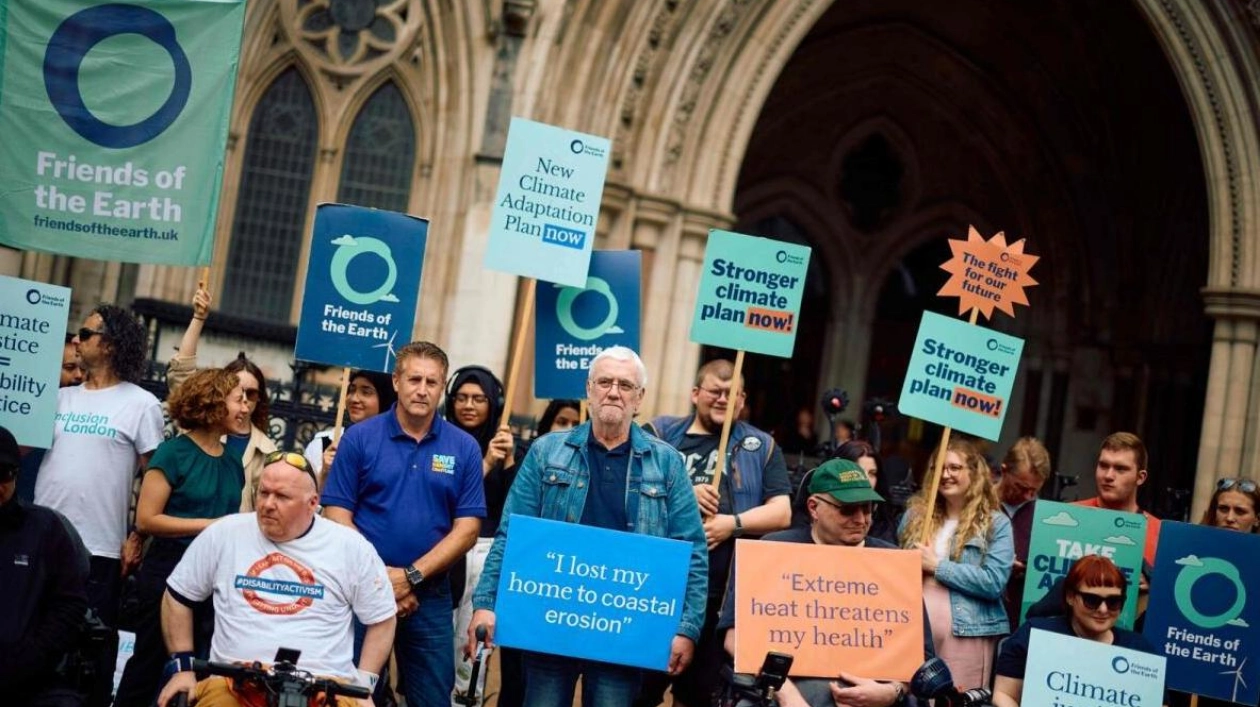On Tuesday, the British government encountered a groundbreaking legal challenge, accused of neglecting to safeguard individuals, property, and infrastructure from the anticipated impacts of climate change. Environmental activists from Friends of the Earth, along with two individuals who claim their lives have been impacted by rising temperatures, initiated a two-day legal proceeding at the High Court in London.
This case marks the first of its kind in the UK and follows criticisms of the government's strategy for managing climate change risks and a significant European court decision against Switzerland. Friends of the Earth and the plaintiffs contend that the UK's National Adaptation Programme, designed to shield against extreme heat, flooding, or coastal erosion, is insufficient and unlawful.
"For the first time in UK legal history, the High Court must determine the legality of the government's climate change adaptation policy, including whether our clients' human rights have been violated," stated attorney Rowan Smith. "This is a truly landmark climate change case, likely to have profound implications for future generations."
The latest National Adaptation Programme (NAP3), updated in July 2023 and required to be refreshed every five years, outlines the government's objectives for climate adaptation and the strategies to achieve them, aiming to protect vulnerable communities. On the first day of the hearing, attorney David Wolfe, representing the campaigners, emphasized the court's role in ensuring the government develops a clear plan in line with legal requirements.
The claimants' legal team will argue that the Conservative government, which lost the recent general election, failed to adhere to the 2008 Climate Change Act when formulating the policy. This act mandates reductions in carbon dioxide emissions and other greenhouse gases and requires adaptation to climate risks. The independent Climate Change Committee (CCC) has urgently called for strengthening the NAP3, warning in March that it significantly falls short of necessary measures.
One of the plaintiffs, 71-year-old Kevin Jordan, had his home on the Norfolk coast destroyed due to coastal erosion without receiving state compensation. The other plaintiff, disability activist Doug Paulley, residing in a care home in northern England, asserts that hotter summers exacerbate his health issues and increase his risk of severe harm. Both criticize NAP3 for inadequately addressing the needs of marginalized groups like the elderly and disabled.
In April, the European Court of Human Rights issued a historic ruling against Switzerland for insufficient climate change efforts. This case, brought by the Elders for Climate Protection, a group of 2,500 women with an average age of 73, highlighted the Swiss authorities' failures in climate protection, potentially impacting their health. This ruling could compel other governments to adopt more ambitious climate policies.
In the UK, where temperatures exceeded 40 degrees Celsius for the first time in 2022, the Tory government delayed climate commitments, including postponing the ban on new petrol and diesel car sales to 2035 and issuing new licenses for North Sea oil and gas exploration. The CCC recently urged the new Labour government to act swiftly to realign the country with its 2030 climate goals, noting that only a third of the required emissions reductions are currently supported by credible plans.
Since assuming power, Labour has lifted a ban on onshore wind power projects and declared the approval of a new UK coal mine a "legal error." In a statement to AFP, the government pledged to "ensure the UK is prepared for changes by strengthening resilience across government and local communities. We will expedite this by enhancing the durability of our infrastructure, strengthening protections against flooding, and planting millions of trees while accelerating green growth," according to the Department for Environment, Food and Rural Affairs.






